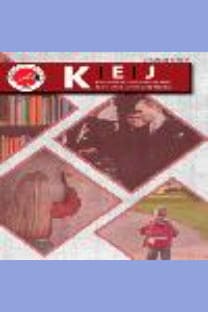CEBİR ÖĞRETİMİNE GEÇİŞTE BİLİNMEYEN VE DEĞİŞKEN KAVRAMLARININ YORUMLANMASI
Bu çalışmanın amacı, altıncı sınıf öğrencilerinin cebir öğretimine geçiş aşamasında bilinmeyen ve değişken kavram kullanımlarını nasıl kullandığını incelemektir. Üç öğrenciye, bilinmeyen ve değişken kavramlarını içeren bir ölçek sunulmuştur. Sonuçlar, denklem çözme ve örüntü bulma gibi cebirsel ifadelerde, öğrencilerin bilinmeyen ve değişken kavramlarını bilinmeyen olarak algıladıklarını göstermektedir.
Anahtar Kelimeler:
cebir öğretimi, aritmetikten cebre geçiş, altıncı sınıf düzeyi
INTERPRETATION OF UNKNOWN AND VARIABLE PRIOR TO FORMAL ALGEBRAIC INSTRUCTION
The purpose of the study is to investigate the sixth grade students’ use of unknowns and variables prior to any formal algebraic instruction. Three students were presented with a questionnaire including the manipulation of unknowns and variables. The students showed the ability to interpret algebraic expressions such as solving equations and finding patterns. It is a crucial point that they defined both of the term of unknown and variable as unknown. In this study it was examined the grounds of this use.
___
- Kieran,C.,(2006). Research on the learning and teaching of algebra. In A.Gutierrez &
- P.Boero (Eds.), Handbook of Research on the Psychology of Mathematics Education: Past, Present and Future (pp. 11-49). Rotterdam: Sense Publisher. Herscovics,N., Linchevski,L.(1994).A cognitive gap between arithmetic and algebra.
- Educational Studies in Mathematics, 27(1), 59–7. Trigueros, M, Ursini, S. (2003). First-year undergraduates’ difficulties in working with different uses of variable. In E. Dubinsky, A. H. Schoenfeld, J. Kaput, (Eds.) Research in Collegiate Mathematics Education (CBMS Issues in Mathematics Education, Vol. 12, pp.1-29). Rhode Island: American Mathematical Society.
- Usiskin, Z. (1988). Conceptions of school algebra and uses of variables. In A. Coxford &
- A. P. Schulte (Eds.), The ideas of algebra, K-12 (1988 Yearbook: pp. 8-19). Reston, VA: NCTM.
- Chalouh,L. & Herscovics, N. (1988). Teaching algebraic expressions in a meaningful way. In A.E.Coxford (Ed.), The ideas of algebra, K-12(1988 Yearbook, pp.33-42). Reston, VA: NCTM.
- Stacey, K. & MacGregor, M. (2000). Learning the algebraic method of solving problems.
- Journal of Mathematical Behavior, 18 (2), 149-167. Foster, D. (2007). Making meaning in algebra examining students’ understandings and misconceptions. In A.H. Schoenfeld (Ed.), Assessing Mathematical Proficiency (MSRI
- Publications , Vol. 53, pp163-176). NY: Cambridge University Press. English, L. D. & Warren, E. A. (1999). Introducing the variable through pattern explorati- on. In B. Moses (Ed.), Algebraic Thinking, grades K-12: readings from NCTM’s school- based journals and other publications, (pp. 141-145). Reston, VA: NCTM.
- Zazkis,R. & Liljedahl, P. (2002). Generalization of patterns: the tension between algebraic thinking and algebraic notation. Educational studies in mathematics, 49, 379-402.
- Lee, L. (1996). An initiation algebraic culture through generalization activities. In N. Bed- narz, C. Kieran & L. Lee (Eds.), Approaches to Algebra. Perspectives for research and teaching (pp. 87-106). Dordrecht : Kluwer.
- Radford, L. (1996). Some reflections on the teaching algebra through generalization. In
- N. Bednarz, C. Kieran & L. Lee (Eds.), Approaches to Algebra. Perspectives for research and teaching (pp. 107-111). Dordrecht: Kluwer. Patton,M .Q.(2002).Qualitative research and evaluation methods(6th ed.), Thousand Oaks, CA : Sage.
- Borko,H. & Livingston,C. (1989). Cognition and Improvisation: Differences in Mathema- tics Instruction by Expert and Novice Teachers .American Educational Research Journal, (4).pp. 473-498.
- Herscovics,N. & Kieran, C. (1999). Constructing meaning for the concept of equation.
- Introducing the variable through pattern exploration. In B. Moses (Ed.), Algebraic Thin- king, grades K-12: readings from NCTM’s school-based journals and other publications, (pp. 181-188). Reston, VA: NCTM. Milli Eğitim Bakanlığı Talim ve Terbiye Kurulu Başkanlığı. (2005). Ilköğretim matema- tik dersi öğretim programı ve kılavuzu (1-5. sınıflar). Ankara: Devlet Kitapları Müdürlü- ğü.
- Herbert, K. & Brown, R.H. (1999). Pattern as tools for algebraic reasoning. In B. Moses
- (Ed.), Algebraic Thinking, grades K-12: readings from NCTM’s school-based journals and other publications, (pp. 123-128). Reston, VA: NCTM. Stacey,K. & MacGregor, M. (1999). Ideas about symbolism that students bring to algebra.
- In B. Moses (Ed.), Algebraic Thinking, grades K-12: readings from NCTM’s school-ba- sed journals and other publications, (pp. 308-312). Reston, VA: NCTM. Aktaş,Ş., Atalay,A., Aygun,S., Aynur,N., Bilge,O, Celik,M., Çuha, Karaman,U., Öcal,İ., Öncü,F., Özçelik,U., Uluğbay,M., Ünsal,N. (2006). İlköğretim matematik 6 ders kitabı,
- Ankara: Devlet Kitapları. Wagner, S. (1999). What are these things called variables? Ideas about symbolism that students bring to algebra. In B. Moses (Ed.), Algebraic Thinking, grades K-12: readings from NCTM’s school-based journals and other publications, (pp. 316-320). Reston, VA: NCTM. Appendix A
- ISSN: 1300-8811
- Yayın Aralığı: Yılda 4 Sayı
- Başlangıç: 1992
- Yayıncı: -
Sayıdaki Diğer Makaleler
Mustafa METİN, Salih BİRİŞÇİ, Kerem COŞKUN
TARİH ÖĞRETMEN ADAYLARININ TÜRK DENİZCİLİK TARİHİ İLE İLGİLİ OLAYLARIN ÖNEMİNE İLİŞKİN DÜŞÜNCELERİ
Hamza KELEŞ, Muhammet ŞAHİN, Özgür AKTAŞ, Nihan EROL
BOLU İLİNDEKİ İŞVERENLERİN ENGELLİ ÇALIŞANLARA YÖNELİK TUTUMLARI
Emine ERATAY, Müzeyyen ELDENİZ ÇETİN
SINIF ÖĞRETMENLİĞİ ÖĞRENCİLERİNİN COĞRAFYA DERSİNE HAZIR BULUNUŞLUKLARININ İNCELENMESİ
Engin ASLANARGUN, Abdurrahman KILIÇ, Merve ERİŞ
İlknur GÜVEN, Mehtap YURDATAPAN, Elif BENZER, Fatma ŞAHİN
İLKÖĞRETİM 7. SINIF TÜRKÇE DERS KİTAPLARINDAKİ ATATÜRK TEMASI METİNLERİNİN DEĞERLENDİRİLMESİ
Taşkın TAŞTEPE, Z. Fulya TEMEL
